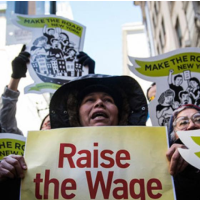Productivity has Grown Six Times as much as Pay over the Last 40 Years
 Andrew Burton/Getty Images
Andrew Burton/Getty Images
Businesses in America have enjoyed steady productivity over the last 40 years while workers have endured wage stagnation over the same period, according to a 2014 think tank study.
The Economic Policy Institute (EPI) says net productivity grew 72.2% between 1973 and 2014. During that same period, hourly compensation of the vast majority of American workers increased only 8.7%, or 0.20% annually. When wages did go up, it mostly happened from 1995 to 2002.
EPI also said only 15% of productivity growth between 1973 and 2014 translated into higher hourly wages and benefits for the typical American worker.
This century, however, the gap between productivity and pay has risen even faster. From 2000 to 2014 net productivity grew 21.6% while inflation-adjusted compensation for the median worker rose only 1.8%.
EPI’s Josh Bivens and Lawrence Mishel concluded that had hourly pay for typical American workers “kept pace with productivity growth since the 1970s, then there would have been no rise in income inequality during that period. Instead, productivity growth that did not accrue to typical workers’ pay concentrated at the very top of the pay scale (in inflated CEO pay, for example) and boosted incomes accruing to owners of capital.”
A report (pdf) from the National Employment Law Project states that underlying weaknesses currently exist in the labor market in spite of evidence of “considerable healing since the Great Recession.” In spite of ongoing expansion of private sector employment and a falling jobless rate, there remains a consistently high number of people who remain unemployed for longer than six months.
“The ‘real’ unemployment rate—which includes those working part time who want full-time work, and those who have stopped searching but if offered a job would take it—remains in excess of 10 percent,” said the report. “Moreover, most workers have failed to see improvements in their paychecks… In fact, taking into account cost-of-living increases since the recession officially ended in 2009, wages have actually declined for most U.S. workers.”
-Noel Brinkerhoff, Danny Biederman
To Learn More:
Understanding the Historic Divergence Between Productivity and a Typical Worker’s Pay (by Josh Bivens and Lawrence Mishel, Economic Policy Institute)
Occupational Wage Declines Since the Great Recession (National Employment Law Project) (pdf)
California Low-Wage Earners’ Reward for Higher Productivity—Less Money (by Ken Broder, AllGov California)
Income Gulf between CEOs and Workers 11 Times Greater than in 1965 (by Matt Bewig, AllGov)
- Top Stories
- Unusual News
- Where is the Money Going?
- Controversies
- U.S. and the World
- Appointments and Resignations
- Latest News
- What If China Invaded the United States?
- Donald Trump Has a Mental Health Problem and It Has a Name
- Trump Goes on Renaming Frenzy
- Trump Deports JD Vance and His Wife
- Trump Offers to Return Alaska to Russia






Comments